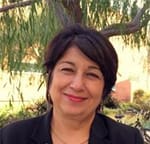A Slice of Democracy
A Report from “Future of Policing” Dialogues in Los Angeles County
 In August of 2015, the “Institute of nonviolent in Los Angeles” (INVLA ) through its Days of Dialogue program, planned large scale dialogues throughout Los Angeles County on the “Future of Policing,” to mark the 50th Anniversary of the Watts Riot. Many sites across LA County were identified and hundreds of people gathered in these sites to share their perspectives on future of policing in a safe environment.
In August of 2015, the “Institute of nonviolent in Los Angeles” (INVLA ) through its Days of Dialogue program, planned large scale dialogues throughout Los Angeles County on the “Future of Policing,” to mark the 50th Anniversary of the Watts Riot. Many sites across LA County were identified and hundreds of people gathered in these sites to share their perspectives on future of policing in a safe environment.
Marking the 50th anniversary of violent confrontation between police and residents of Watts raised the important questions on what has changed during the last fifty years, since Watts Riot, in terms of the mistrust between police and African American community. How we can resolve this deep rooted conflict in a nonviolent, peaceful and civil manner?
The fact is that police forces in United State resort to violence in a shocking scale compare to EU Countries. According to The Guardian interactive report, The Counted in the first 6 months of 2015, 732 people were killed by police in America and it is estimated that this number will reach to 1,100 in 2015. The report also mentions that in the twenty four days of June 2015, 59 people have been killed in United State by police, whereas in the UK in the last twenty four years, 55 people were killed by police (US population 316.1 million and the population of England is 56.9 million).
The location of the meeting that I signed up for it was Youth Justice Coalition. We had presence of one of the four officers attending the dialogue in our group. The dialogue highlighted the following points.
- Future Policing should provide a safe environment for younger people to grow and be a productive member of their community. But, safety is not enough as these communities have other educational, economic, social challenges in terms of accessing resources in LA County.
- The local police should be from the same neighborhood to be familiar with the people and know the residents. One member of the group mentioned that not long ago a mentally challenged young person was shot and killed by police as he was not following the police orders. If the officer was from the same neighborhood, he or she knew that the person is mentally challenged.
- To create and maintain a safe and secure community, collaboration and trust is essential and key between police officers and community members. Having said that, all the community members expressed that the bridge of trust is completely broken!
- The internal culture of police organizations must be shifted and more cities should invest new and additional resources in training officers in cultural awareness, conflict resolution and other pertinent learnings that can facilitate a more positive and trust based interaction between the officers and community members.
- The role of the police is to maintain public safety. The stop and frisk routine, stopping young people of color in the street without a reason, is actually unconstitutional. The Fourth Amendment requires that the police have a reasonable suspicion that a crime has been, is being, or is about to be committed before stopping a suspect. If the police reasonably suspect the person is armed and dangerous, they may conduct a frisk, a quick pat-down of the person’s outer clothing.
At the end of more than two hours of dialogue, a middle-aged woman said: “You protect the system and the system protects you. Justice will never be served for the officers who are engaged in wrong doing and violent behavior against unarmed people “.
As an Iranian-American, I left the session thinking that in many societies across the world, even having a dialogue such as the one we had at the Youth Justice Coalition is not lawful and the people who expressed their views based on respecting freedom of speech/expression could have been prosecuted and even jailed for insulting authorities. It is only on the principles of human rights and dignity, freedom of expression and assembly that we can collectively “impact policy and elicit real change.”
Written by Elahe Amani
